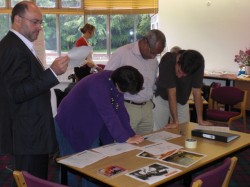Approach to learning
 The ‘plan a workshop’ pages do not aim to provide an exhaustive catalogue of every possible approach to learning about power. The purpose of these pages are to support the understanding and practical application of the concepts and approaches outlined on this website, with emphasis on the powercube, its various dimensions of power: forms, spaces and levels, and other complementary frameworks for understanding of power. See pages on other forms of power.
The ‘plan a workshop’ pages do not aim to provide an exhaustive catalogue of every possible approach to learning about power. The purpose of these pages are to support the understanding and practical application of the concepts and approaches outlined on this website, with emphasis on the powercube, its various dimensions of power: forms, spaces and levels, and other complementary frameworks for understanding of power. See pages on other forms of power.
The methods are based on the experiences of practitioners and educators with broadly shared ways of understanding power and facilitating learning about it. These pages use learner-centred, experiential and reflective methods inspired by various traditions which connect adult learning and social change:
- critical pedagogy, participatory action research and transformative learning used in developing awareness and leadership within social movements
- action research and reflective practice for organizational learning and change, coming from management science
- adult and higher education, especially experiential and reflective learning and methods of critical theory and analysis
- feminist research, training and activism, in which participants explore personal and gendered dimensions of identity, standpoint and power
Users of the ‘plan a workshop’ pages should not worry if unfamiliar with these traditions of adult learning. They have some key principles in common which are applied in the design of learning in this guide and can be easily picked up through practice, for example:
- experiential knowledge: people already know a great deal from their own experience and practice, and making this knowledge more conscious and accessible to them can itself be a form of empowerment
- facilitating reflection: the facilitator’s role is not to transfer knowledge and skills, but to help people reflect on their own knowledge and experience, using concepts, theories and others’ experiences to deepen analysis
- questioning assumptions: learning is deeper when contradictions are explored and dominant world views, values and assumptions are critically examined
- diversity of methods: methods for facilitating learning can take many forms and these can be combined: some applied and practical, some reflective and analytical, some creative and artistic, some embodied and emotional
- diversity of learners: people have different ways of knowing and learning, so using a variety of methods is more likely to meet the needs of a diverse group
- individual and collective processes: learning requires both individual and collective (social) processes for creating understanding
- learning in context: learning is more effective when related to particular contexts, questions and issues of practical relevance and urgency for learners
- opportunities for action: learning is consolidated when opportunities are available to apply knowledge through meaningful action
There is no ‘right way’ or order for using the exercises and resources that follow, and we encourage you to use this guide flexibly rather than as a fixed curriculum. Much will depend on who is learning, what their needs are, and what time is available. For example, a short exposure for senior managers will be different from an in-depth training event. The exercises and resources can be ‘mixed and matched’ to design your own events.
We hope that you will innovate and adapt to fit the needs of your learners and contexts, and that you will choose the methods and exercise that you are comfortable facilitating. These pages are intended to be used together with the other resources included on powercube.net, and facilitators should be familiar with the section on understanding the powercube, and also the section on other forms of power. The resources section containing examples of applying the powercube in practice will also be useful to read.

